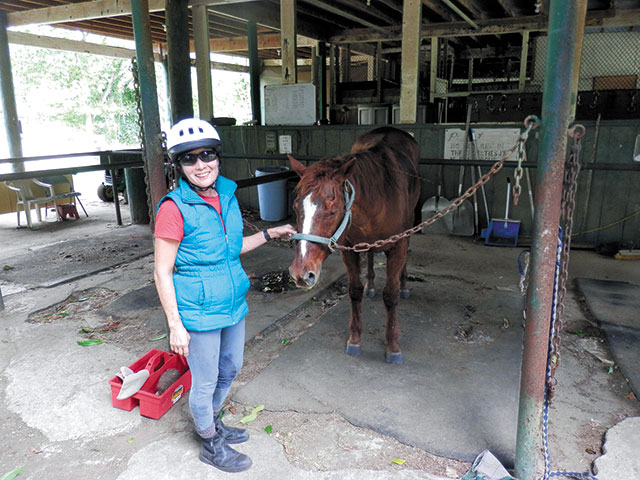Denial Of Trail Use, Lease Concerns Stymie Koko Crater Stables
By PAIGE TAKEYA

Owner Emogene Yoshimura, DVM, with one of her equine tenants at Koko Crater Stables. Photo by Kimo Franklin.
Koko Crater Botanical Garden has been a fixture in East Oahu since 1928, and Koko Crater Equestrian Center, more popularly known as Koko Crater Stables (KCS), has been a fixture of the garden area since 1961.
But changes over the last few years have not been for the better, according to veterinarian Emogene Yoshimura, an avid equestrian and the owner and operator of the stables.
KCS lost access in 2008 to a two-mile riding trail that runs through the garden — an activity riders had enjoyed for 45 years. And now even the renewal of her five-year lease next September is uncertain.
“It was very sudden, very unannounced,” Yoshimura said of the trail loss. “And it’s part of my lease … the first item is exclusive access to the botanical garden trails by my patrons.”
KCS is the last remnant of the “tremendous ranching heritage of the region,” said Kimo Franklin, a longtime Hawaii Kai resident with ties to the stables. “It’s a landmark; it provides a tremendous recreational and educational benefit to the community.”
Besides paying customers, it also works with University of Hawaii, Girl Scouts, Boy Scouts and schools to let young people work with horses — an opportunity that Yoshimura said few have, given that the monthly cost of keeping a horse is about $2,000.
“With that track record, and how valuable an asset the stable is to this com munity, it’s a little bit hard to fathom the city’s position,” Franklin noted.
Yoshimura has been trying unsuccessfully to regain access to the trail. “We’ve been doing everything possible,” she said. “We have requested an opening on a limited basis, and right now, we’ve gotten negative feedback.”
In an Oct. 4, 2013, letter to City Councilman Stanley Chang, city Department of Parks and Recreation director Toni Robinson explained that Yoshimura’s July 2013 request was denied because “there are great public safety concerns as well as concerns about the protection and preservation of the plant collections.”
Franklin believes those worries are unfounded: “(There was) never, ever, in 45 years, an instance — not one single injury, not one single incident of property damage to any of the plants, trees, shrubs or anything in there.”
Yoshimura speculates about another factor. “(Botanical garden officials) think that horse manure on the trail is offensive, and they don’t realize it can actually be used by the plants.”
If cleanliness is the issue, Franklin said, internal conversations center around banding together to maintain the trails in a sort of partnership with the city and the community.
The city never has elaborated fully on its concerns to her, Yoshimura noted, and her lease beyond September is uncertain. “Every time it’s come up for renewal, I never know. We can just hope.” In 2013, she won a verbal, 12-month extension.
In her letter to Chang, however, Robinson wrote of ongoing concerns “as to whether commercial activity is allowed, and if so, whether proper permitting was adhered to in the past and/or should be currently.”
If the stables’ lease is not renewed, Yoshimura said she expects her decades of effort will just become an extension of the garden itself.
Franklin agrees with Elizabeth Reilly of Livable Hawaii Kai Hui that the community wants KCS to stay where it is — and as it once was. “The time is right for (the community) to let the city know that there … needs to be transparency on what their thoughts are for this area.”
Reilly added that she has talked to many area residents and found nothing but goodwill for the stables. That being so, any plans for the Hawaii Kai area, she said, should be had outside of city doors. “That conversation should be brought to the neighborhood board and the larger community,” said Reilly, a member of the Hawaii Kai board.





